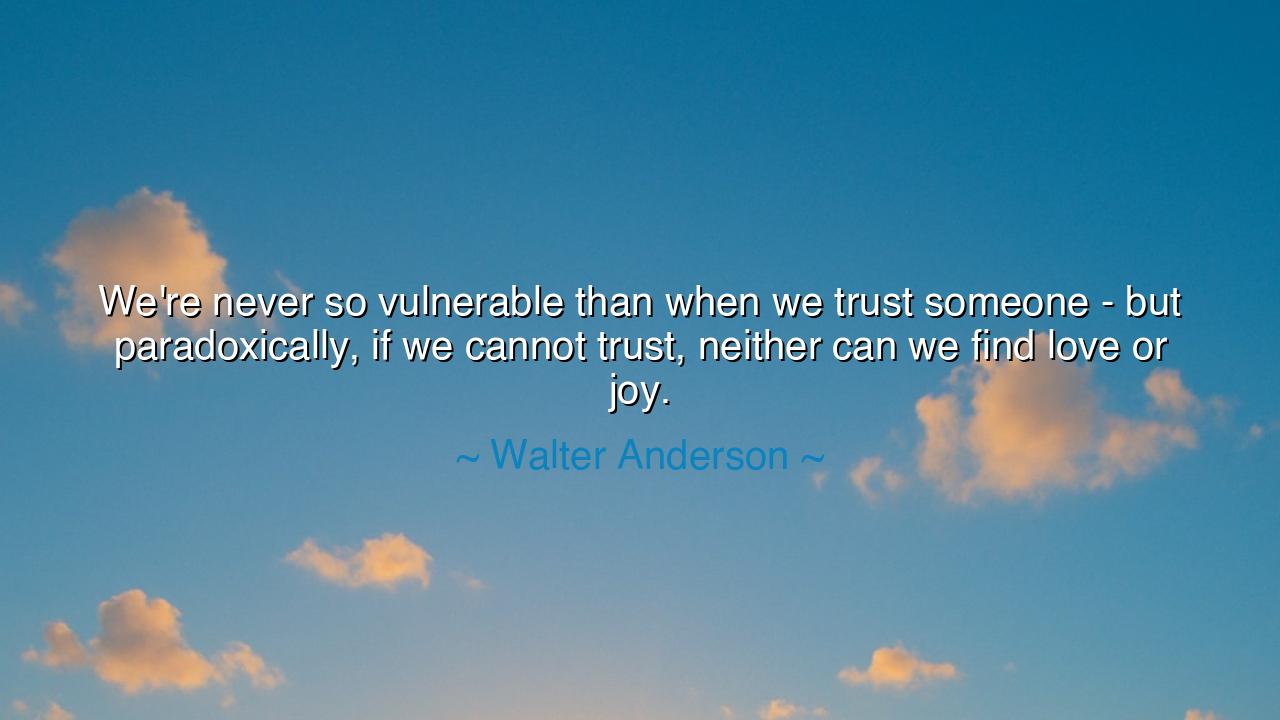
We're never so vulnerable than when we trust someone - but
We're never so vulnerable than when we trust someone - but paradoxically, if we cannot trust, neither can we find love or joy.






“We’re never so vulnerable than when we trust someone — but paradoxically, if we cannot trust, neither can we find love or joy.” Thus spoke Walter Anderson, and though the words are gentle, they strike with the force of eternal truth. In this saying lies the divine tension of the human heart — that to trust is to risk, and yet without risk, the soul remains barren. The one who builds walls around the heart may keep out pain, but he also shuts out the sunlight of love and the fragrance of joy. Trust, therefore, is the narrow bridge across the abyss between isolation and belonging, between fear and fulfillment.
To be vulnerable is to expose oneself, to lay one’s soul open like a field to the rain. It is an act of courage, not weakness. For only the strong dare to trust, knowing they might be wounded, and yet stepping forward anyway. Anderson calls this the paradox of the heart — that the same act which makes us most fragile also gives us our greatest strength. To love is to risk rejection, to hope is to risk disappointment, to believe in another is to risk betrayal — and yet without these risks, life becomes a shadow of itself, an empty fortress echoing with silence.
The ancients knew this truth well. Consider the tale of Julius Caesar and Brutus, a story carved into the memory of history. Caesar, mighty ruler of Rome, trusted Brutus as a son. Yet it was Brutus’ blade that struck him down, and his final cry — “Et tu, Brute?” — has come to symbolize the deepest wound of betrayal. But what if Caesar had never trusted anyone? He might have lived longer, yes — but he would have lived alone, loveless and fearful, ruling over stone instead of hearts. The tragedy of his death does not diminish the nobility of his trust. For it is better to be betrayed in love than to never have loved at all.
Trust is the seed of connection from which all human relationship grows. A child reaches for a parent’s hand in faith that they will be caught if they fall. A friend confides their secret, hoping it will be held in confidence. A lover bares their soul, believing they will not be scorned. Each act of trust is a sacred offering, and each acceptance of that trust is a holy duty. When we honor it, we create bonds of light; when we betray it, we darken the world. Yet even in betrayal, the lesson endures: love cannot live behind locked doors.
The origin of Anderson’s insight lies in the understanding that human joy is not born of safety, but of openness. True happiness is not the absence of pain, but the presence of meaning — and meaning is born in relationship. To trust is to say, “I see you; I place something of myself in your hands.” In that moment, we mirror the eternal exchange between the Creator and the created, between the soul and the universe. Trust, then, is not merely emotional — it is spiritual, the heartbeat of every true connection.
Look also to Mahatma Gandhi, who trusted his people with his dream of peace, though the world called it impossible. He placed his faith not in certainty, but in goodness — and through that faith, inspired a nation to rise. His trust was not naïve; it was courageous. And in that courage lay his triumph. For as Anderson teaches, without trust there can be no love, and without love, there can be no joy, no progress, no freedom.
Thus, the lesson stands clear: guard your heart with wisdom, but not with fear. Let trust be given not recklessly, but generously. Understand that pain may follow, yet remember that only those who risk the wound of love ever taste its sweetness. To close your heart against betrayal is to condemn yourself to loneliness; to open it despite fear is to walk the noble path of the brave.
Therefore, my friends, walk through life with open hearts and discerning eyes. Trust as the sun trusts the horizon — knowing it will fall, yet believing it will rise again. Do not let past hurts harden you into silence, for joy is found only by those who dare to be vulnerable. And when you trust — when you give your heart freely and with honor — you become part of the ancient lineage of those who have loved boldly and lived fully. For though trust makes us fragile, it is through that very fragility that we become beautifully human.






AAdministratorAdministrator
Welcome, honored guests. Please leave a comment, we will respond soon